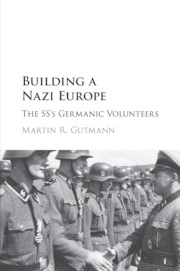Reviews
 Masculinity and the German First World War Experience: A Secret History
Masculinity and the German First World War Experience: A Secret HistoryReview of Jason Crouthamel's An Intimate History of the Front: Masculinity, Sexuality, and German Soldiers in the First World War (Basingstoke: Palgrave Macmillan, 2014), in Reviews in History.
In his classic thriller Greenmantle, first published in 1916, John Buchan describes his hero Richard Hannay's first encounter with his adversary, the German officer Colonel Ulrich von Stumm, in a fashion which hints at a hidden strain of sexual deviance within the German armed forces:Read more...
 Review of 'Contested Commemorations' by Benjamin Ziemann
Review of 'Contested Commemorations' by Benjamin ZiemannReview of Veterans and Weimar Political Culture, by Benjamin Ziemann (Cambridge: Cambridge University Press, 2012), in The English Historical Review 131 (553), December 2016, pp. 1569-71.
Views of the Weimar Republic as essentially anarchic, unloved and unmourned have been extensively questioned in recent scholarship. Still, popular pronouncements tend to perpetuate such impressions – witness one critic of a recent exhibition, who began with the statement that ‘Nobody in Germany liked the Weimar Republic’. Read more...
 History's proximity? Crisis and Colonisation in Greece – and the Greek Imagination
History's proximity? Crisis and Colonisation in Greece – and the Greek ImaginationReview of Daniel M. Knight, History, Time, and Economic Crisis in Central Greece (New York: Palgrave Macmillan, 2015) and Sheila Lecoeur, Mussolini’s Greek Island: Fascism and the Italian Occupation of Syros in World War II (London: I.B. Tauris, 2015), in Reviews in History.
There were times during the resurgence of the economic crisis in 2015 when it seemed as if 'Greek-bashing' had become a pan-European pastime. In this fraught international context, Daniel Knight’s first monograph provides a salutary reminder of the human consequences of austerity.Read more...
 Greek Debts: Literal and Symbolic; Ancient and Modern
Greek Debts: Literal and Symbolic; Ancient and ModernReview of Johanna Hanink's The Classical Debt: Greek Antiquity in an Era of Austerity (Cambridge, MA: The Belknap Press of Harvard University Press, 2017), in Reviews in History.
At the height of the Greek financial crisis, reports from colleagues based in Athens painted a sorry picture of citizens who had fallen upon hard times desperately rummaging in dustbins to supplement their dwindling larders. The statistics told an even grimmer story – between 2010 and 2011, suicide rates in Greece rose by 40 per cent.Read more...
 Review of 'The "New Man" in Radical Right Ideology and Practice, 1919-1945'
Review of 'The "New Man" in Radical Right Ideology and Practice, 1919-1945'Review of The “New Man” in Radical Right Ideology and Practice, 1919-1945, ed. Jorge Dagnino, Matthew Feldman, and Paul Stocker (London: Bloomsbury, 2018), published in Reviews in History, review no. 2386, April 2020.
During the interwar period, the figure of the ‘New Man’ constituted a powerful symbol of the promise and potential of a thorough-going political and anthropological revitalisation of society, which could effectively counteract widely-perceived notions of crisis and decline in the aftermath of the Great War.Read more...
 Review of 'The Oxford Illustrated History of the Third Reich'
Review of 'The Oxford Illustrated History of the Third Reich'Review of The Oxford Illustrated History of the Third Reich, ed. Robert Gelatelly (Oxford: Oxford University Press, 2017), published in History: The Journal of the Historical Association 104, Issue 362, October 2019, 783-5.
With the editorship of a new illustrated history of the Third Reich aimed at a popular readership comes both great responsibility and great opportunity – a challenge to which Robert Gellately, one of those historians who has done most to shape the historiography of Nazi Germany recently, has risen with aplomb.Read more...
 Review of Martin Gutmann, 'Building a Nazi Europe'
Review of Martin Gutmann, 'Building a Nazi Europe'Review of Building a Nazi Europe: The SS's Germanic Volunteers by Martin Gutmann (Cambridge: Cambridge University Press, 2017), in History: The Journal of the Historical Association 106, Issue 369, December 2020, pp. 143-5.
Martin R. Gutmann’s monograph lucidly demonstrates that nationality need be no bar to conniving in atrocity, or the will to participate in Nazism’s violent and genocidal vision for a new Europe.Read more...
 Review of 'Making Prussians, Raising Germans' by Jasper Heinzen
Review of 'Making Prussians, Raising Germans' by Jasper HeinzenReview of State-Building after Civil War, 1866-1935, by Jasper Heinzen (Cambridge: Cambridge University Press, 2017), in German History 35 (3), September 2018, pp. 454-6.
Jasper Heinzen’s first monograph aims to reframe historical interpretations of ‘1866 and all that’, focusing on the ramifications of civil war within Germany, rather than privileging external conflicts with Italy and Austria. What consequences did enduring tensions between Prussian imperial and provincial particularist ambitions have for Germany's eventual stability?Read more...
 Classics and National Socialism
Classics and National SocialismReview of Klio und die Nationalsozialisten: Gesammelte Schriften zur Wissenschafts und Rezeptionsgeschichte (Wiesbaden: Harassowitz, 2017), published in The Classical Review 69 (2), October 2019, pp. 666-7.
Volker Losemann’s work has rightly been hailed as pioneering in its efforts to bring to light the ideological distortions and academic opportunism to which Classical and ancient historical scholarship were subjected during the Third Reich. Read more...
 Review of 'German Philhellenism' by Damian Valdez
Review of 'German Philhellenism' by Damian ValdezReview of Damian Valdez, German Philhellenism: The Pathos of the Historical Imagination from Winckelmann to Goethe (Basingstoke: Palgrave Macmillan, 2014), in Journal for Eighteenth-Century Studies 40 (1), March 2017, pp. 138-9.
Damian Valdez’s monograph provides a keen dissection of the clashing currents of idealism and historicism which shaped German thought on ancient Greece during the eighteenth century, placing idealism – and particularly idealists such as Goethe, Herder, Schlegel and Winckelmann – squarely within their respective contexts.Read more...
